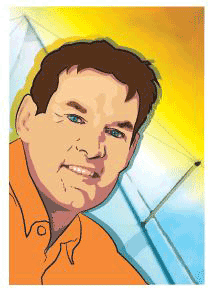Proust questionnaire: Alan Ruddiman, MD

What profession might you have pursued, if not medicine?
Competitive yachtsman.
Which talent would you most like to have?
That of an oracle or soothsayer. I am in awe each day with the opportunities and unconditional choices that the future can offer each of us.
What do you consider your greatest achievement?
Earning my medical degree in South Africa in the 1980s. I have been blessed with the ability to travel internationally, to meet my wife, Christina, in Canada while working in the Prairies, have two awesome daughters, and to cap it off have a rewarding rural generalist career in British Columbia.
Who are your heroes?
My first and formative boyhood hero for sure was my father, Bill Ruddiman. I stand on his shoulders! Nelson Mandela will forever be a statesman whose ethos reminds me to honor and respect my moral compass. Elon Musk, an earnest entrepreneur who is so courageous and bold at a time when we need visionary leaders.
What is your idea of perfect happiness?
A rewarding and inspiring day in my practice followed by an epic kiteboarding session on one of the nearby Okanagan lakes. I then round out the day by enjoying a homemade meal with my wife and daughters while listening to the girls’ limitless aspirations for the future. The album Cold Fact by Rodriguez is softly playing in the background. We wrap it all up making plans for our next overseas trip while sipping on a bold BC Meritage blend from our current favorite BC winery.
What is your greatest fear?
Being whisked off terra firma before experiencing the fascinating lives that my daughters are sure to have as adult women, and completely missing getting to know the families they may start one day.
What is the trait you most deplore in yourself?
The inability to extract being a purist and idealist from my DNA.
What characteristic do your favorite patients share?
Longevity. My Doctors of BC annual practice profile reminds me that my average patient is now in his or her 80s. These octogenarians have inspired me with their life stories, their candid and brave approach to the remaining years, and their humility in reminding me often that life is to be cherished.
Which living physician do you most admire?
Dr Anna Reid, past president of the CMA. A true proponent of family medicine and rural generalism, a bold and brave leader, and an all-round kind and gentle human being.
What is your favorite activity?
I am most at peace when I am sailing, alone or with close friends.
On what occasion do you lie?
Only rarely to protect those whom I love.
Which words or phrases do you most overuse?
At the office, “How are you today?” When socializing, “Here’s a true story,” followed by a lengthy anecdote on all manner of topics.
Where would you most like to practise?
Have you been to and experienced the South Okanagan lately? I truly live and work in a profound Canadian utopia.
What is your most marked characteristic?
Being strategic and tenacious. It gets the job done.
What do you most value in your colleagues?
Honesty and empathy.
Who are your favorite writers?
Malcolm Gladwell, Wilbur Smith, and lately Naomi Klein.
What is your greatest regret?
That colonialism exercised by so many nations was once deemed to be of noble effort. Its lasting devastation worldwide saddens me the more broadly I travel. A very close second is my inner embarrassment for not being a much braver activist against apartheid during my formative school and university years in South Africa.
How would you like to die?
Participating in any activity that has me dying with a smile on my face!
What is your motto?
Carpe diem. Why accept mediocrity as a way of defining who we are or who we strive to be?
hidden
Dr Ruddiman has practised full-service rural generalist medicine in the Okanagan Valley for the past 19 years. He is a founding member of the Society of Rural Physicians of Canada and a recipient of the Fellowship in Rural and Remote Medicine. He is co-chair of the provincial Joint Standing Committee on Rural Issues, a two-term Board Director of Doctors of BC, and the current GP Member-At-Large elected to the Board Executive. He lives and works in Oliver.
